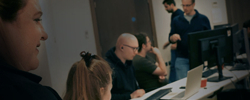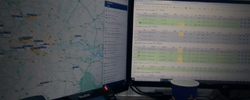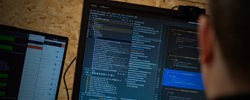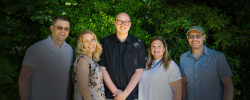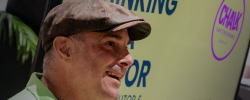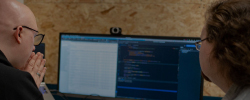What does a software developer actually do all day? Hollywood would have us believe that they’re sitting in dark bunkers with code coming out of their fingertips at top speed. Some might! But there’s more to the role, at least at Switchplane, than you might initially think.
We’re sharing a typical day in the life of Lewis, one of our senior software developers. Lewis has been with Switchplane for five years; he joined us straight from college, just a week before his earlier plans to start a Computer Science course at university. His experience and skills have gone from strength to strength and now he handles anything we throw at him, from coding and architecture to project management, client meetings, and developer operations.
Let’s hand over to Lewis to find out what he gets up to…
8am
I’m an early bird, so I typically start work at about 8am. If I’m working from home, I’ll make a coffee, switch on, and get started for the day. However, I prefer working at Cohub, a co-working space in Eastbourne town centre, so I might swing by Nelson’s for some caffeine before making it to my desk.
Typically I’ll start the day by catching up on emails and checking out what’s been happening on Slack since I was last online. Usually there will be some new information to feed into my planning, or questions from other developers and clients to respond to.
I might do some quality control work before others start for the day, so I can generally get through quite a lot at this time without interruptions. Getting the QC done means I can release a new feature to a client’s system. It gives me the whole day to keep an eye on how it is being used and react to any client questions or issues.
8am
I’m an early bird, so I typically start work at about 8am. If I’m working from home, I’ll make a coffee, switch on, and get started for the day. However, I prefer working at Cohub, a co-working space in Eastbourne town centre, so I might swing by Nelson’s for some caffeine before making it to my desk.
Typically I’ll start the day by catching up on emails and checking out what’s been happening on Slack since I was last online. Usually there will be some new information to feed into my planning, or questions from other developers and clients to respond to.
I might do some quality control work before others start for the day, so I can generally get through quite a lot at this time without interruptions. Getting the QC done means I can release a new feature to a client’s system. It gives me the whole day to keep an eye on how it is being used and react to any client questions or issues.
10am
I join Google Meet for our daily stand up (another thing that happens as part of Agile Scrum) and say hi to the rest of the team. We review our timings and move work around between us, if needed, to help one another out. Everyone has the chance to raise any points for discussion - possibly a question about a piece of work, possibly something that is blocking them from getting started on a request. This way, we can all win at completing the sprint together.
10.05am
Stand up will more often than not lead into a one-on-one chat with another developer, most likely about resolving a blocker, or it could be a quick catch up before one of us starts work on a request. We pass over the relevant information and go through the plan for the request, and agree on what the end result will be.
10.15am
I pick a nice chunky request to settle down and get my teeth into. We share all project work amongst the team, so this could be from any one of our clients. For the developers reading, at Switchplane, we tend to use a Docker environment with AWS (S3, ECS, Lambda, SQS etc) and a web stack of modern PHP, javascript, and MySQL - although we’ll use any language that’s appropriate for the work. For iOS and Android app development, we use Flutter and Dart. The most important thing, though, is test-driven code!
12.15pm
I take a break for a quick bite to eat. If I’m working from home, I’ll have a chat with any family members around, or if I’m at Foundry, I might pop out to one of my many regular coffee shops or speak to another Switchplaner, Steve, who works opposite me.
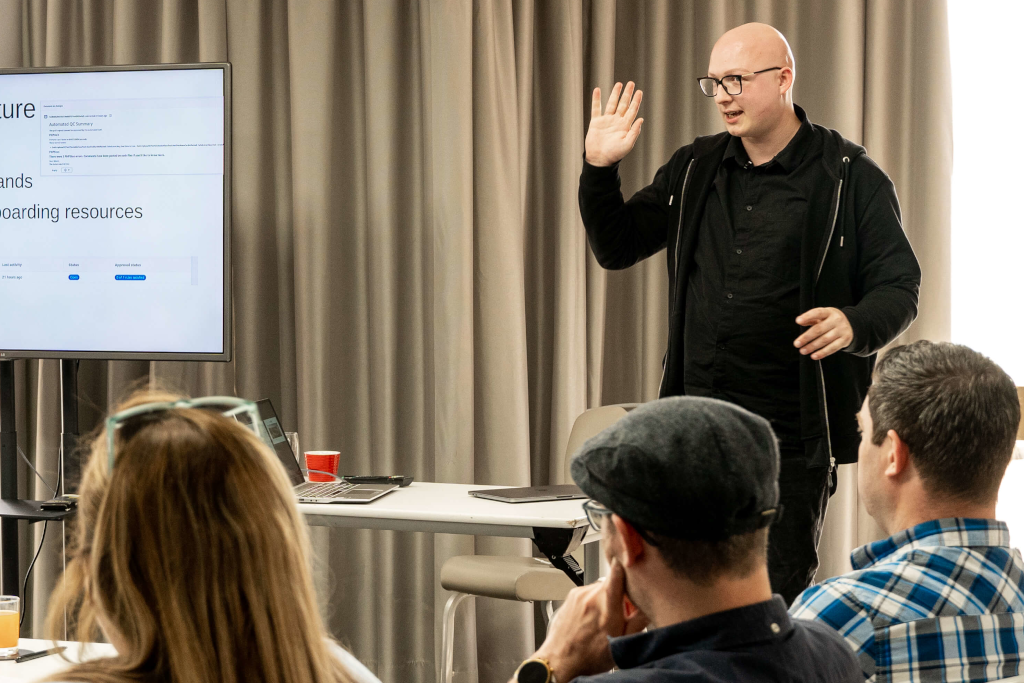
12.45pm
With a client meeting coming up at 1pm, I review the work that has been completed on their project this sprint and prepare my ‘show and tell’ of this work. I look ahead a little to what work is in the pipeline and make a note of any questions I need to ask to help with the planning of this.
1pm
I log on to Zoom or Teams with Sarah C and we meet our client. I share my screen and talk through the features we’ve most recently implemented and how they’re used. The client will typically ask questions and give their feedback as we talk through it, and Sarah C makes a note of any changes requested. Her notes are vital when it comes to remembering what we talked about in detail!
We then go on to discuss what’s to be worked on next and talk through the expected workflows, so I can make sure we deliver what the client needs. The client sometimes has tasks to work on to help us with the next phase of work, such as preparing workflows or gathering information from others in their company. More often than not, they’ll probably go away to do some testing on the new feature with their team on the staging version of their site and bring us feedback at our next meeting - or give us the all-clear to release to live.
I’ll often have a five minute debrief with Sarah C so we can make sure we both understood everything in the same way, and we often take the opportunity to catch up on other projects and blockers. Inevitably we’ll end up talking about our vegetable growth in our gardens!
2.05pm
After a meeting, I’ll sometimes plan for the next Sprint while things are fresh in my mind, but more often than not, I’ll be wanting to get stuck into some more development work! I’ve been doing a lot of DevOps work over the last few months to keep our infrastructure up to date and improve the messaging and logs that we see as developers. This can really help with troubleshooting issues and making developer lives easier.
3pm
Uh-oh! Sarah C reports that a client has an issue. I drop what I’m doing to sort it out, as it affects all their team. It’s not serious though, so they are up and running again quickly.
3.15pm
There’s not quite enough time left in my day to start a large request, so I’ll use this time for a shorter one-hour request, to finish up some planning, or I’ll QC some requests that the other developers have worked on for my projects.
4.30pm
I’m done for the day! I head off home. When I get home, I’ll often sit down again to work on my passion projects: I’m building my own server at the moment. Or I’ll head out to the vegetable patch to water my crops or dig up some fresh beetroot (I’m swamped - anyone want some?).
Thanks to Lewis for sharing details of his day. To find out more about our other team members, visit our team page.
hey!
We build custom software with your team, for your team. Our apps and web platforms bring about meaningful change for businesses across the UK.









